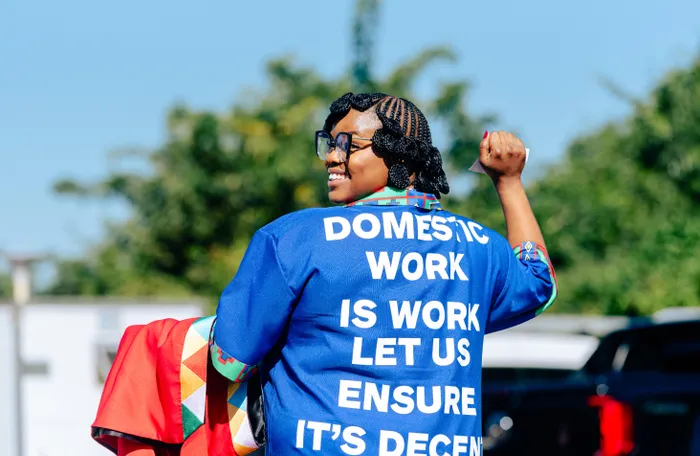The power and grace of domestic workers
dignity

Dr Thobeka Ntini-Makununika became a domestic worker at the age of 13. This week she graduated with a PhD and her thesis examined the plight and power of domestic workers.
Image: Supplied.
Dr Thobeka Ntini-Makununika’s PhD journey didn’t begin with lectures, textbooks or quiet library halls. It began with mops, brooms and the silent dignity of three generations of women who cleaned other people’s homes to survive.
This week the Unizulu lecturer graduated from UKZN, with a study that humanised domestic work, and redefined its societal value. At the age of 13 she started her first job as a domestic worker, following in the footsteps of her late mom, her aunt and her late grandmother.

Dr Thobeka Ntini-Makununika celebrating her graduation surrounded by family. On the left is her aunt, Khanyisile Ntini. On her right is her brother Thembinkosi Mqakanya-Mgudlwa and her aunt Ntombifuthi Ntini.
Image: Supplied.
“While children my age enjoyed their play times during the weekends and school holidays, mine were really reserved for domestic chores, caring for people's children, running errands for my bosses. At the time I was a child, but because I've got a bigger body and a bigger bust, it was very easy to fake that.”
For seven years, she worked part-time for white families and at holiday resorts in KZN and she knows what it means to get up at the crack of dawn and catch a bus to go to work. After completing two Masters degrees in social work, one in multiple countries overseas, she decided to be intentional about her studies and ensure that her PhD is challenging, personal and meaningful.
Those early childhood experiences now form the basis of her groundbreaking PhD thesis: “Unravelling the Dynamics of Power in the Employer-Domestic Worker Relations in Contemporary South Africa, KwaZulu-Natal: Praxis-Oriented Research.”
“Education, for me, is resistance,” Ntini-Makununika said. “I carry the sacrifices of generations of women in my family into every chapter I wrote.”
When she took up domestic work she was an orphan and her aunt and grandmother supported her efforts because they needed the money. “So that's how I got into domestic work and that's what has encouraged me to look at these power dynamics between domestic workers and their employers. From my own experiences, and I think from a lot of literature that's out there on domestic workers, it highlights a lot of victimisation, it highlights a lot of abuse, voicelessness, exploitation, which is true.”
However, she says domestic workers do have agency and she has seen them use it. The danger of the dominant narrative of victimisation was that domestic workers branded themselves as victims.
“As if they're not even negotiating the power between themselves and employers. The other side to the problem is where employers are painted, oftentimes, as so powerful as if they are untouchable.”
Ntini-Makununika notes that at times domestic workers can actually make employers feel powerless. “The dynamics are much more complex than just a domestic worker being powerless and an employer being powerful. A domestic worker is able to inconvenience an employer when they want to, or as an act of resistance. Maybe they had an argument, or there are things that they don't like. Because a domestic worker has access to the whole house and you end up knowing a lot of dynamics in the house, information that is probably sacred to the employer,” she said.
She hailed domestic work as the bridge to feminism which allow women to be part of the job market. “When we go to work, who takes care of the home? Who takes care of the children? Without them it would be very difficult for us to participate fully and also even for our well-being. Can you imagine being a mother, being at work, worried about your child? The presence of a domestic worker takes that out. There is just so much power in their job and in the kind of gaps that they fill in these homes. They make other jobs possible.”
One of the major findings from her research is that power is not binary but fluid and negotiated. Her studies dispel the notion that employers are always powerful and domestic workers completely powerless. “Sometimes employers would express their anxiety, discomfort and uncertainty in their relations with domestic workers, showing that there is power imbalance and it was not just unidirectional.”
In addition while all the domestic workers she interviewed were black, the employers were from various race groups. Exploitation, said Ntini-Makununika is not just racial but rooted more in social position. “Black people now have a currency to employ domestic workers as well. Some of my participants cited black employers being the worst. “That tells you that this is not just about race, it is about social positioning where we class people.”
Ntini-Makununika said there were many reforms that were needed in the industry and called on employers to pay their domestic workers decent wages, give them written contracts and not add on unexpected responsibilities like child-rearing when it was not discussed or paid for.
“If I cannot afford a Gucci, I don't go to Gucci. I go to my Pick n Pay or to my Mr. Price. If you don't hire them full-time because you can’t afford it, then pay them for a day and pay what's due to them because that allows them to work for someone else,” she said.